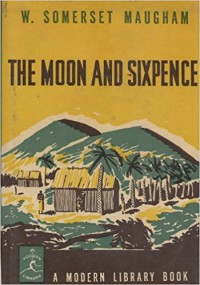The Moon And Sixpence

I picked up 'The Moon and Sixpence' a few years ago at a library book sale thinking, purely from the cover image and my limited knowledge of when Maugham wrote, that it was a novel about the Pacific in World War II. It turns out I was way off. Which is fine by me since I wasn't eager to read a novel about the Pacific in World War II. I used to pick up any old Modern Library book that still had its dust jacket.
What this novel is is a memoir-biography of the fictional painter Charles Strickland (who is loosely based on Paul Gauguin). The narrator writes from a present where Strickland's paintings, some years after his death, have become popular and influential. The narrator is writing in part to correct the white-washing his family is perpetuating about Strickland and to satisfy his own curiosity about the artist.
The best parts of this novel are the opening chapters that first sum up the current articles and conflicting histories of Strickland's life, complete with citations. Maugham is gleeful in his tearing down of critics, apologists and blowing away the smoke that screens the true character of an artist. In fact, we don't 'meet' Strickland for quite some time. The narrator first goes through his social life as a young novelist, doubtlessly sending-up many people of the day, but I'm not familiar enough with the literary scene in the late-1800s, early 1900s to identify them.
Throughout the book, in fact whenever an important conversation is coming, or a scene is being described, the narrator explains that he wrote all in his own words, because 1. he can't remember verbatim what people said, and 2. many people, especially Strickland himself, lacked the means to express their full meaning in words alone. In one case, an entire episode of Strickland's life is thrown into doubt because the man who told it to the narrator was "doubtless" a liar and likely made the whole thing up. This kept me at a distance as a reader somewhat, but I admired how well Maugham kept up the conceit.
The characters were great, too. Strickland is an awful person, completely unlikable and almost purposely cruel in his actions, but he is vividly drawn. Other characters, from Dirk Stroeve, the kind but belittled man who draws awful "chocolate-box" pictures to Tiare Johnson, a woman "with arms like legs of mutton, her breasts like giant cabbages", are fantastic.
'The Moon and Sixpence' was a novel that I loved reading, line by line it ranks as the best I've read this year, but it just didn't add up to much by the end. A lot of the humor and bite disappeared after Strickland's departure from Paris and the narrator no longer had a first-hand account of the man's actions.













